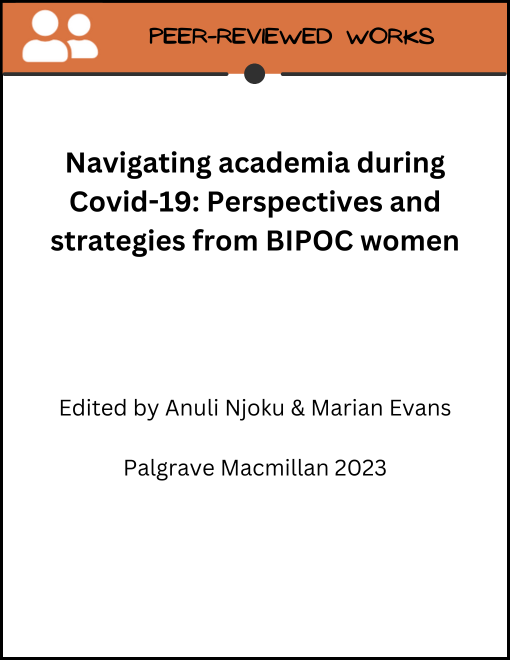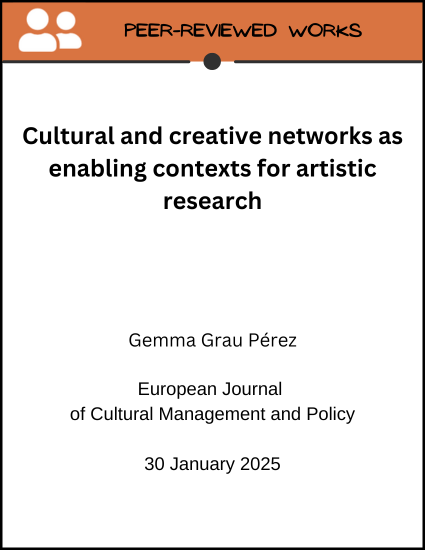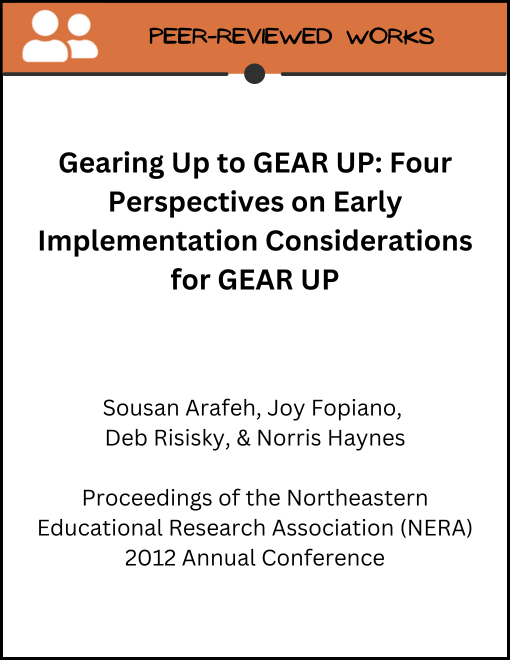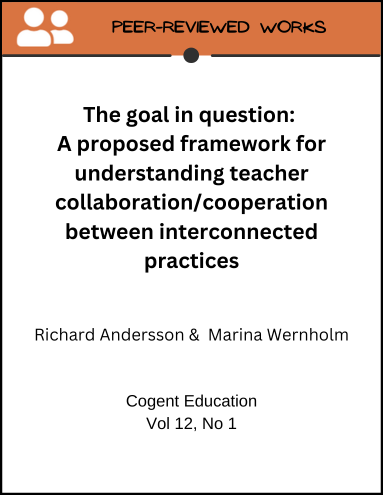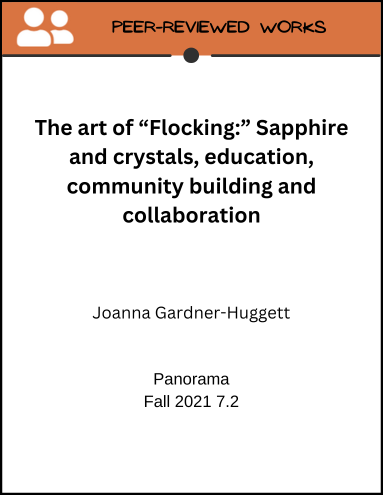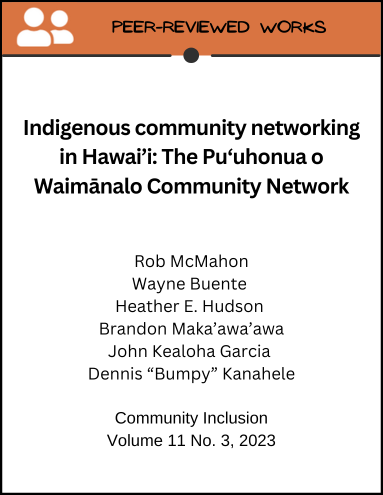Peer-Reviewed Works
The articles, books, and other works in this section are either original peer-reviewed writings submitted specifically to JCEC or links to peer-reviewed open source material. The research in this section of JCEC focuses on many different ways to collaborate for equitable change and represents scholarship and action from a wide range of disciplines and communities.
JCEC peer-reviews and publishes original works that are submitted to us, and links to Open Access works based on their Creative Commons licensing designation.
Click on the thumbnail article titles to be linked to the article.
Abstract: This edited volume provides personal narratives of a diverse group of scholars in academia regarding strategies to navigate academia during times of COVID-19 and unrest. Black, Indigenous, and People of Color (BIPOC) women in academia are grappling with emotional tolls and invisible burdens, discrimination, political turmoil, social unrest, and public health crises. Moreover, the rapid pivot response to COVID-19 has exacerbated inequities among BIPOC women in academia. This book explores their stories of ordeal, triumph, loss, and hope. Author approval for linking. CLICK HERE
Abstract: Cultural and creative networks serve as essential environments that could foster innovation and advancement within artistic research practice. This study investigates how formal networks contribute to strengthening transdisciplinary collaboration, interdisciplinary dialogue, and societal impact of artistic research. Leveraging grounded theory principles, the research delves into the ways in which these networks can provide fertile ground for exploring novel artistic research pathways across ontological, epistemological, and methodological dimensions. Through the analysis of key categories and themes emerging from the empirical research, this study highlights the role of formal networks in the cultural and creative sector, particularly in addressing discipline-specific challenges and unlocking the full potential of artistic inquiry. By shedding light on the mechanisms through which networks facilitate the production and dissemination of knowledge, this study offers insights into the evolving landscape of artistic research and its broader societal impacts. The practical implications of the findings for practitioners, policymakers, and artistic stakeholders are examined. Ultimately, the findings underscore the significance of leveraging cultural and creative networks as drivers of transformative advancements within the artistic research community. CC BY CLICK HERE
Abstract: GEAR UP, a federally-funded pre-college outreach program, strives to provide academic and other supports to middle and high school students and their families to help them prepare for, and pursue, higher education. GEAR UP was established in 1998 and has helped well over 1.5 million students and families in 534 Partnership and State grant programs throughout the United States and its territories (National Council for Community and Education Partnerships (NCCEP), 2011). This paper utilizes a phenomenological frame to explore certain key considerations involved in the initial implementation phases of a GEAR UP grant. Four distinct qualitative phenomenological perspectives from Southern Connecticut State University (SCSU) faculty members involved in a current State of Connecticut GEAR UP grant Alliance are shared. Through these four accounts, qualitative, descriptive information about specific systemic, organizational, content, and procedural factors to consider when beginning implementation and planning for a 6-year university-school district partnership like GEAR UP are considered. Specific areas of focus are social emotional learning, evaluation, inter-systemic administration and organization, and professional development. The information here is preliminary and intended to contribute in-depth program content and process information to assist with program building and collaborative team building in the kinds of inter-systemic and inter- and intraorganizational partnerships that multiple year programs such as GEAR UP require. The insights are not necessarily limited to GEAR UP, however, and may be applicable to other partnership initiatives and/or other large-scale program implementation efforts. CC BY-NC-ND CLICK HERE
Abstract: Collaboration as means for development purposes is a widely desired goal within educational organizations and encapsulates an array of different actors linked to school operations as well as interconnected practices. While this holds true, implementing collaborative structures is associated with multiple hardships and challenges in practice. The aim of this study was to explore processual aspects of collaboration between two interconnected practices in the Swedish school system: the compulsory school and the Swedish school-age educare, and through this exploration propose a framework for understanding how these aspects might affect collaboration between interconnected educational practices. Designed as a qualitative study, individual practice studies through questionnaires were collected from teachers in the Swedish school-age educare and principals responsible for the educational program. The findings of the study highlight factors hindering and enabling collaboration (and cooperation) between the interconnected practices, and based on these findings propose a framework grounded in interorganizational relationship-theory as a tool for future research on similar collaborative processes. Published 2025. CC BY NC CLICK HERE
Abstract: “There is an art to flocking; staying separate enough not to crowd each other, aligned enough to maintain a shared direction, and cohesive enough to always move toward each other.” —adrienne maree brown
This quote by adrienne maree brown provided the title and inspiration for the Chicago Park District’s summer 2018 program, The Art of Flocking: Cultural Stewardship in the Parks, which engaged 2,500 youth and their families through 215 public programs and exhibitions to explore the histories and legacies of Mexican American artist Hector Duarte and Sapphire and Crystals, Chicago’s longest-standing Black women artists’ collective. These words come from brown’s 2017 book Emergent Strategy: Shaping Change, Changing Worlds in which the pleasure activist frames her vision for collaboration and societal change through the writing of Octavia Butler, biomimicry, and civil rights histories, specifically emphasizing how small actions and connections among people can lead to the creation of a more just and liberated future. CC BY-NC 4.0 CLICK HERE
Abstract: Shaping digital inclusion policy and practice to meet community-defined goals requires more than access to digital devices and connectivity; it must also enable their effective design and use in situated local settings. For the Nation of Hawai’i, a Kānaka Maoli (Hawai’ian) sovereignty organization with a land base in Pu‘uhonua o Waimānalo on the island of Oahu, these activities are closely associated with broader goals of Nation-building and sovereignty. Recognizing there are many different approaches to sovereignty among diverse Kānaka Maoli, in this paper we document how the Nation of Hawai’i is conceptualizing the ongoing evolution of their community networking project. We suggest that the Pu‘uhonua o Waimānalo initiative reflects one Indigenous organization’s efforts to frame community networks as a means to generate a “sovereignty mindset” among members of the Nation, as well as share resources and experience among local community members and with other communities in Hawai’i and beyond. CC BY CLICK HERE

